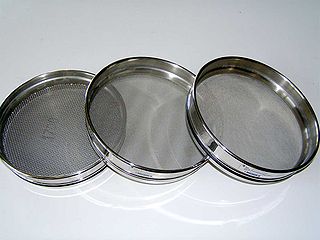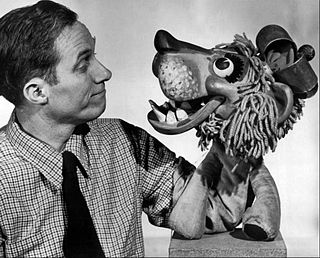
A thermocouple, also known as a "thermoelectrical thermometer", is an electrical device consisting of two dissimilar electrical conductors forming an electrical junction. A thermocouple produces a temperature-dependent voltage as a result of the Seebeck effect, and this voltage can be interpreted to measure temperature. Thermocouples are widely used as temperature sensors.
Section 31, in the fictional universe of Star Trek, is an autonomous intelligence and defense organization that carries out covert operations for the United Federation of Planets. Created by Ira Steven Behr for the Star Trek: Deep Space Nine episode "Inquisition", the organization was intended to act as a counterbalance to the utopian portrayal of the Federation.

A desk or bureau is a piece of furniture with a flat table-style work surface used in a school, office, home or the like for academic, professional or domestic activities such as reading, writing, or using equipment such as a computer. Desks often have one or more drawers, compartments, or pigeonholes to store items such as office supplies and papers. Desks are usually made of wood or metal, although materials such as glass are sometimes seen.

A sieve, fine mesh strainer, or sift, is a tool used for separating wanted elements from unwanted material or for controlling the particle size distribution of a sample, using a screen such as a woven mesh or net or perforated sheet material. The word sift derives from sieve.

A scientific calculator is an electronic calculator, either desktop or handheld, designed to perform calculations using basic and complex mathematical operations and functions. They have completely replaced slide rules as well as books of mathematical tables and are used in both educational and professional settings.

MythBusters is a science entertainment television program, developed by Peter Rees and produced by Australia's Beyond Television Productions. The series premiered on the Discovery Channel on January 23, 2003. It was broadcast internationally by many television networks and other Discovery channels worldwide. The show's original hosts, special effects experts Adam Savage and Jamie Hyneman, used elements of the scientific method to test the validity of rumors, myths, movie scenes, adages, Internet videos, and news stories.

Chinese water torture or a "dripping machine" is a mentally painful process in which cold water is slowly dripped onto the scalp, forehead or face for a prolonged period of time. The process causes fear and mental deterioration on the subject. The pattern of the drops is often irregular, and the cold sensation is jarring, which causes anxiety as a person tries to anticipate the next drip.
Dragonology is a series of books for children and young adults about dragons, written in a non-fictional style. The series contains information on dragons, including about how to befriend and protect them as well as an alphabet of the dragon language, ancient runes, and replica samples of dragon scales. The series later expanded to include figures, plush toys, models, a strategic board game, a card game, and a video game for the Nintendo DS. Books in the series are credited to fictional authors such as Dr. Ernest Drake, a member of the Secret and Ancient Society of Dragonologists, and the author of the series' first book, Dragonology: The Complete Book of Dragons (2003).

Salvatore Paul Belleci is an American television personality and model maker, best known for his work on the Discovery Channel television program MythBusters. He has also worked with Industrial Light and Magic on films including Star Wars: Episode I – The Phantom Menace and Star Wars: Episode II – Attack of the Clones. The Federation battleships and podracers are some of Belleci's pieces.

A hand puppet is a type of puppet that is controlled by the hands that occupies the interior of the puppet. A glove puppet is a variation of hand puppets. Rod puppets require one of the puppeteer's hands inside the puppet glove holding a rod which controls the head, and the puppet's body then hangs over most or all of the forearm of the puppeteer, and possibly extends further. Other parts of the puppet may be controlled by different means, e.g., by rods operated by the puppeteer's free hand, or strings or levers pulled the head or body. A smaller variety, simple hand puppets often have no significant manipulable parts at all. Finger puppets are not hand puppets as they are used only on a finger.

Book design is the art of incorporating the content, style, format, design, and sequence of the various components and elements of a book into a coherent unit. In the words of renowned typographer Jan Tschichold (1902–1974), book design, "though largely forgotten today, [relies upon] methods and rules upon which it is impossible to improve, [and which] have been developed over centuries. To produce perfect books, these rules have to be brought back to life and applied". Richard Hendel describes book design as "an arcane subject", and refers to the need for a context to understand what that means.

Shop 'til You Drop is an American game show that was on the air intermittently between 1991 and 2005. Four different series were produced during that time, with the first premiering on Lifetime on July 8, 1991, and the fourth series airing its final episode on May 27, 2005, on PAX TV.
The cast of the television series MythBusters perform experiments to verify or debunk urban legends, old wives' tales, and the like. This is a list of the various myths tested on the show, as well as the results of the experiments.

Nicholas Redfern is a British best-selling author, journalist, cryptozoologist and ufologist.
Canongate Books is an independent publishing firm based in Edinburgh, Scotland.

The CRC Handbook of Chemistry and Physics is a comprehensive one-volume reference resource for science research. First published in 1914, it is currently in its 104th edition, published in 2023. It is known colloquially among chemists as the "Rubber Bible", as CRC originally stood for "Chemical Rubber Company".

Rafael Alvarez is an American author based in Baltimore and Los Angeles. Alvarez went to work for the Sunpapers of Baltimore as a teenager—first in the circulation department and then the horse racing desk in sports—before landing on the City Desk as a utility man and neighborhood folklorist. He was with The Sun from 1977 through 2001. After leaving the paper, Alvarez worked on ships as a laborer before joining the staff of the HBO drama The Wire. He also worked on the NBC crime dramas Life and The Black Donnellys.

Banana equivalent dose (BED) is an informal unit of measurement of ionizing radiation exposure, intended as a general educational example to compare a dose of radioactivity to the dose one is exposed to by eating one average-sized banana. Bananas contain naturally occurring radioactive isotopes, particularly potassium-40 (40K), one of several naturally occurring isotopes of potassium. One BED is often correlated to 10−7 sievert ; however, in practice, this dose is not cumulative, as the potassium in foods is excreted in urine to maintain homeostasis. The BED is only meant as an educational exercise and is not a formally adopted dose measurement.













